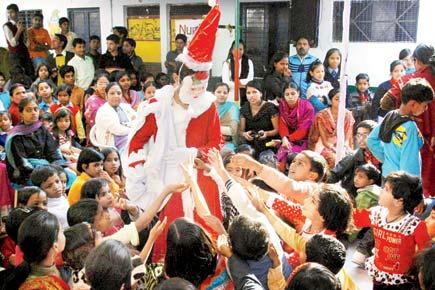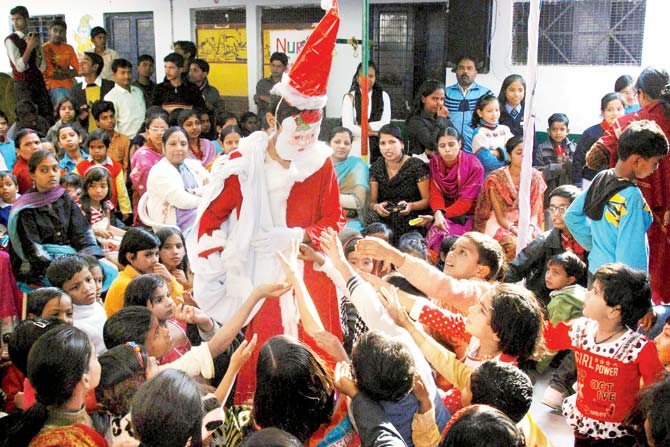Though the cash crunch has forced people to be conservative about their spending this year, the festive mood will still continue


A child dressed as Santa Claus, distributes sweets during a school function. Pic/AFP
ADVERTISEMENT

My sister and I have always shared an annual ritual of playing Christmas songs long before December could officially begin. Chestnuts roasting on an open fire by Nat King Cole has been our anthem, even though we have never had chestnuts to roast or experienced what it feels for jack frost to be nipping at our noses. We have mistletoes but no turkey. We’re happy to settle for sorpotel. Speaking of which, this year, since she’s in Delhi with me, we’ve decided to host an early Christmas dinner so we could have an excuse to make the epic Goan feast staple together ourselves for the very first time. I’ll spare my vegetarian readers the details of the entire exercise, but it involves the invocation of so many people, so many other memories until you realise that a fabulous dish is never the sum total of its specified ingredients. It will always exist beyond the space of the kitchen, sometimes even necessitating the summoning of ghosts of women long since dead, who were integral to the structure of the final recipe.
Christmas sweets are a must in our house. My mother and father always go overboard, and dada never disappoints with the dodol, his version of which is the stuff of the sweetest dreams. One bite of its soft fleshy rice-jaggery goodness and you feel all at once the varied texture of his love; its complexity and generosity and grace. My mother will unfailingly tell us about how as a young bride who’d moved to Kurla, she knew nothing about how to make these Bombay Goan sweets, how the neighbour in the building opposite, and the neighbour downstairs would come to her kitchen and teach her everything she now knows about proportions and ratios and how to achieve perfection in a single kulkul bite.
It isn’t going to be a smooth Christmas, thanks to the cash crunch that has facilitated serpentine queues outside banks. We’ll be forced to be conservative about our spending. But the kitchen rituals must continue. I dread to think about a time when we buy our sweets at the supermarket, relegating the handmade quality that has always been part of their character to a thing of the past; a peculiarity of the ‘olden days’. Each year I tell myself I print my father’s Christmas recipes; but each year he struggles to find where he’s kept them, a symptom of age, the inevitability of forgetting. The pages are frayed, his cursive handwriting is pristine; and the quantities noted are figures he has arrived at and were never readymade.
It’s not the religiosity of Christmas that I am attached to as much as everything it heralds; the festivity, the flavours, the small acts of gratitude and giving. It’s when dada’s stirring the dodol, and my mother is around, anticipating the finale, when that which was conceived as liquid must slowly turn semi-solid; when each spoon of ghee adds a glaze, blackening the black-jaggery black, thickening its consistency, and when the contents are entreated into a tray, and finally, on Christmas morning, when it’s cut into to diamond-shaped portions to be scooped upon a tray in the company of other home-made sweets that are then distributed to our Hindu and Muslim neighbours. That’s when the spirit of the season is firmly embalmed and you realise that its tradition and roots constitutes our collective identities.
Deliberating on the life and times of Everywoman, Rosalyn D’Mello is a reputable art critic and the author of A Handbook For My Lover. She tweets @RosaParx. Send your feedback to mailbag@mid-day.com
 Subscribe today by clicking the link and stay updated with the latest news!" Click here!
Subscribe today by clicking the link and stay updated with the latest news!" Click here!






